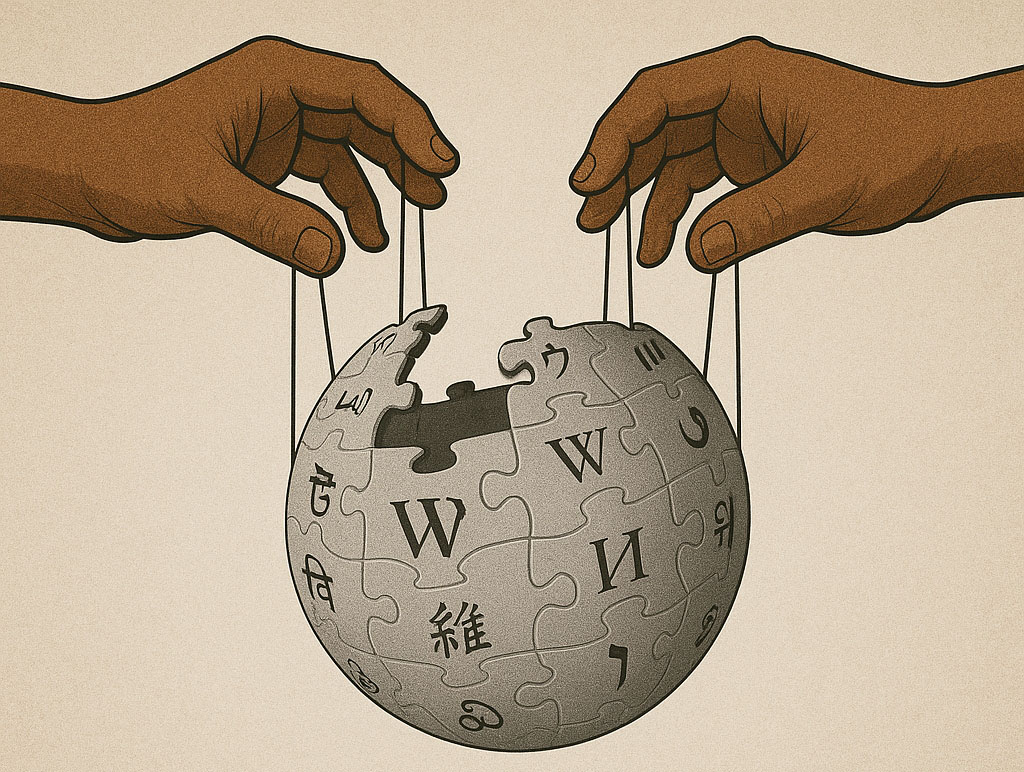Wikipedia’s Arbitration Committee (ArbCom), the site’s version of a Supreme Court, announced on April 25 that two editors have been banned from the site entirely for “off-wiki misconduct” in the Palestine-Israel articles (PIA) topic area.
In their announcement, the committee said it had reviewed a 244-page dossier that The Journal published in the “Gaming the Wiki System” cover story chronicling the purported activities of the Wikipedia channel in the Tech for Palestine Discord server.
“The Arbitration Committee has reviewed a dossier of ‘Tech4Palestine’ Discord server related evidence and has determined that, as of this time, the concerns raised have been adequately addressed,” the committee wrote. “The evidence has been retained by the Committee to be used, if necessary, to corroborate additional evidence received.”
It then listed all of the editors mentioned in the dossier. Several of them only made a handful of edits and haven’t been active in a while; thus the committee concluded that there’s “no action necessary, can be addressed if they return.” But the committee did site-ban one editor mentioned in the report, “Isoceles-sai,” which the committee said was the result of obtaining “additional evidence of off-wiki coordination independent of the Tech4Palestine Discord server.” The committee concluded that Isoceles-sai had violated Wikipedia policies on offsite coordination and canvassing, which is defined as notifying editors “with the intention of influencing the outcome of a discussion in a particular way.”
Another editor, “GeoColdWater,” was also site-banned for violating those policies based on the “additional evidence of off-wiki coordination independent of the Tech4Palestine Discord server” that ArbCom received. GeoColdWater is not mentioned in the dossier and there is no established link between the editor and the Discord channel as of publication time.
A sockpuppet investigation (Wikipedia defines sockpuppetry as misusing multiple accounts) was filed on April 11 against GeoColdWater, Isoceles-sai and two other editors. The editor who filed the report, “Chess,” alleged that the four editors were meatpuppets of each other, which Wikipedia defines as individuals promoting “their causes by bringing like-minded editors into the dispute, including enlisting assistance off-wiki.” Ultimately the case was closed with no action.
As for the rest of the editors mentioned in the dossier, the original sanctions on three editors in December remain the same; those three editors were “Ïvana” (site-banned), “Samisawtak” (indefinitely topic banned from the Israel-Palestine topic area) and “Tashmetu” (extended confirmed protection privileges revoked, meaning they can no longer edit areas like Israel-Palestine that require at least 30 days editing and 500 edits to begin editing there). There were two other editors listed in the dossier, one of whom edits in the French Wikipedia (and thus outside of the committee’s jurisdiction) and the other was not found to have engaged in any wrongdoing.
“Better late than never,” one editor told me about the result. “ArbCom can definitely take their time sometimes and be rather slow and bureaucratic much like a real court.”
“Better late than never. … ArbCom can definitely take their time sometimes and be rather slow and bureaucratic much like a real court.”
The longtime editor behind “The Wikipedia Flood” blog, who has written about the Discord server, told me that it’s hard for them to comment on ArbCom’s latest actions since “I haven’t seen the evidence, but all those ‘sleeper’ accounts that stopped contributing months ago could start again at any time. Besides, no matter how many accounts they penalize, there will always be more. That’s why Wikipedia needs to be stripped of its tax-exempt status.”
A different editor called ArbCom’s actions a “toothless, distractionary [sic] gesture,” telling me that “nothing has changed here” and that “ArbCom still cannot find a way to apply more than a topic ban for people for conducting six-month canvassing operations” despite other editors being site-banned for lesser offenses in the past month. The editor was specifically referencing Samisawtak, believed to be Samer, one of the ringleaders of the Tech for Palestine Discord channel. In response to a question at “Arbitration/Requests/Clarification and Amendment” (ARCA) page (the wiki-equivalent of a Supreme Court hearing, where ArbCom hears arguments on if it should take a case) on why Samisawtak was only topic banned, ArbCom member “Captain Eek” replied: “Whether ArbCom imposes a particular remedy over another includes a wide range of factors, and is ultimately a vote where each Arb may have a different reason.”
Chess accused Samisawtak on his talk page of violating his topic ban in March when he made an edit to the Wikipedia page for Antoinette Lattouf. Lattouf is a journalist who was let go from ABC’s (Australian Broadcasting Corporation) local radio program after the outlet claimed she had violated company policy in a social media post about the ongoing Israel-Hamas war, prompting Lattouf to file an unlawful termination lawsuit against the outlet. Samisawtak told Chess that the edit was simply about “Freedom of Speech in Australia.” Chess countered that “someone who was fired for pro-Palestinian activism may be about freedom of speech in Australia, but it is related to the Israel-Palestine conflict and is encompassed in the topic-ban.” Samisawtak asked if he had to undo his edit, to which Chess warned him not to do it again. One editor told me that typically those that violate topic bans receive warnings first, and any further violations would result in escalating sanctions enforced by the admins. Another editor told me, however, that Samisawtak made it clear that he’s not there to build an encyclopedia, “and made it super clear the moment they returned and broke the rules again. Are the settings stuck on ‘warn’? When will the transgressions be sufficient?”
The latter editor further criticized ArbCom for “telling us ‘we won’t ban people caught canvassing because they’ve been off site for a while but if and when they come back on the site maybe we’ll address this then?’ and thinking we will find more safety in their leadership.”
Proceedings at ARCA have shed some more light on the processes behind ArbCom’s actions against members of the Tech for Palestine Discord server. In response to queries on ARCA asking why ArbCom never received the 244-page dossier published by The Journal, CaptainEek said that the committee received a download link from an anonymous individual — the purported WeTransfer link containing the dossier — “which years of email safety taught me not to click.” “They then keep sending attachments,” CaptainEek said of the anonymous individual who sent them the dossier. “I assumed that the attachments were the same as the download link, and that it wasn’t necessary to potentially download a tracker from a questionable individual. Nothing that our source said made it clear that this download link was five times larger than the other evidence.” CaptainEek did provide a “mea culpa” and pledged to be “more exacting in the future.” CaptainEek said that “our first investigation was based primarily on information sent from a different confidential source than this one, so we actually had another source of info which allowed us to handle the other editors.”
When an editor pointed out that follow-up emails indicated that more evidence was forthcoming and asked if it was communicated to the individual submitting evidence that there were security concerns with opening the download link and if the individual explained why they were anonymous, CaptainEek replied that she was not at liberty to disclose such information.
In response to questioning about the French Wikipedia editor, CaptainEek said that “the French effectively lack an ArbCom at the moment.”
ArbCom member “ScottishFinnishRadish” wrote in ARCA that the dossier “had a great deal of focus on editors with a handful of edits, or that were already blocked, and didn’t really add anything above what we’d already received. By the time I reviewed it almost everything actionable was done, and based on additional private evidence unrelated to the dossier we took some other actions. It sucks that we don’t have a better system of tracking the enormous amount of issues that come to us. It also sucks that someone forgot a couple emails out of literally thousands from six months earlier, but that happens.”
“Aoidh,” another member of committee, noted in ARCA that in January, ArbCom passed a motion to appoint a coordinating arbitrator whose responsibilities include “acknowledging the receipt of correspondence and assigning tracking identifiers to pending requests and other matters” and “tracking the status of pending matters and providing regular updates and reminders on the status of the Committee’s off-wiki work to arbitrators.” Aoidh contended that this change “has so far been very effective in its implementation.”
One editor told me that “ArbCom might be starting to wake up to the fact that they can’t just delay and drag feet with procedural bureaucratic slowness if it helps Hamas or when it comes to antisemitism.” Another editor, however, questioned “the substance” of the motion referenced by Aoidh “if there doesn’t seem to have been any retroactive application to submitted evidence … We also have in one ArbCom member openly boasting they had never received evidence, only to later reverse their entire story upon questioning and affirm it had been in their inbox all along (and further produce a laundry list of questionable excuses as to why they failed to download or review evidence that they now remember they did receive and simply decided not to review). And then there’s the other ArbCom member openly lamenting that they ‘don’t have a better system of tracking the enormous amount of issues that come to us.”
The latter editor contended that “we need accountability, we need reform, and we need it now.”




